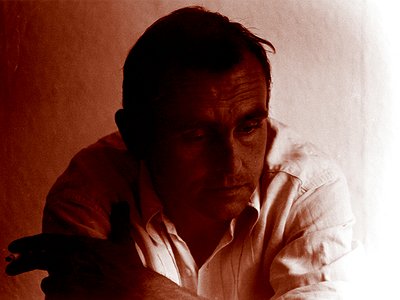When the differences disappear
In how much, do you feel, are creative decisions shaped by cultural differences – and in how much, vice versa, is the perception of sound influenced by cultural differences?
I’m doing what I’m doing out of the belly. My music is well understood all over the globe. That’s what I’m sure about when I look at the amount of reviews, fan mail etc. that I’ve received through the decenniums.
But I don’t care about cultural differences anyway. I guess that my work by its inner sense, somehow causes those differences to disappear into thin air. I feel very privileged to be able to do what I WANT TO and that this is well appreciated by an audience that obviously doesn’t care about differences at all.
The relationship between music and other forms of art – painting, video art and cinema most importantly - has become increasingly important. How do you see this relationship yourself and in how far, do you feel does music relate to other senses than hearing alone?
Many people are happy to listen to music within a visual context, but I think music in general doesn’t need any visuals. “Real music” creates its own pictures inside the listener and that’s what it should do.
There seem to be two fundamental tendencies in music today: On the one hand, a move towards complete virtualisation, where tracks and albums are merely released as digital files. And, on the other, an even closer union between music, artwork, packaging and physical presentation. Where do you stand between these poles?
I’m voting for the physical product.
The role of an artist is always subject to change. What's your view on the (e.g. political/social/creative) tasks of artists today and how do you try to meet these goals in your work?
The role of an artist is to make serious art from his heart as a stepping stone for a better situation, culturally and politically, for everybody.
Music-sharing sites and -blogs as well as a flood of releases in general are presenting both listeners and artists with challenging questions. What's your view on the value of music today? In what way does the abundance of music change our perception of it?
I try to avoid reflecting too much on this problem. I don't want to get “lost in reality” with “my art” because it undermines what I know I have to do and in which way.
How, would you say, could non-mainstream forms of music reach wider audiences?
If audiences could be taught constantly about otherness and the variety, strength and beauty of non mainstream music via all platforms that spread the word nowadays, they would be well prepared to learn to understand and appreciate it; they would ask for it instead of buying mainstream stuff.
Usually, it is considered that it is the job of the artist to win over an audience. But listening is also an active, rather than just a passive process. How do you see the role of the listener in the musical communication process?
Real art convinces the ”consumer” with its inner quality, if their mind & heart is open to it. An artist doesn’t have to win, but his art and the role of the listener in the communication process is to echo it back to the artist.
Reaching audiences usually involves reaching out to the press and possibly working with a PR company. What's your perspective on the promo system? In which way do music journalism and PR companies change the way music is perceived by the public?
Oh yes public relations and promotion is a very big part of the business. Journalists can do a lot for a product especially when they like it personally. But if the product doesn’t fit general expectations then it needs time to get it to a broader audience.
Please recommend two artists to our readers which you feel deserve their attention.
Mira Lu Kovacs, singer songwriter.
Clemens Neufeld, dj. composer
Visit Hans-Joachim Roedelius online at www.roedelius.com






